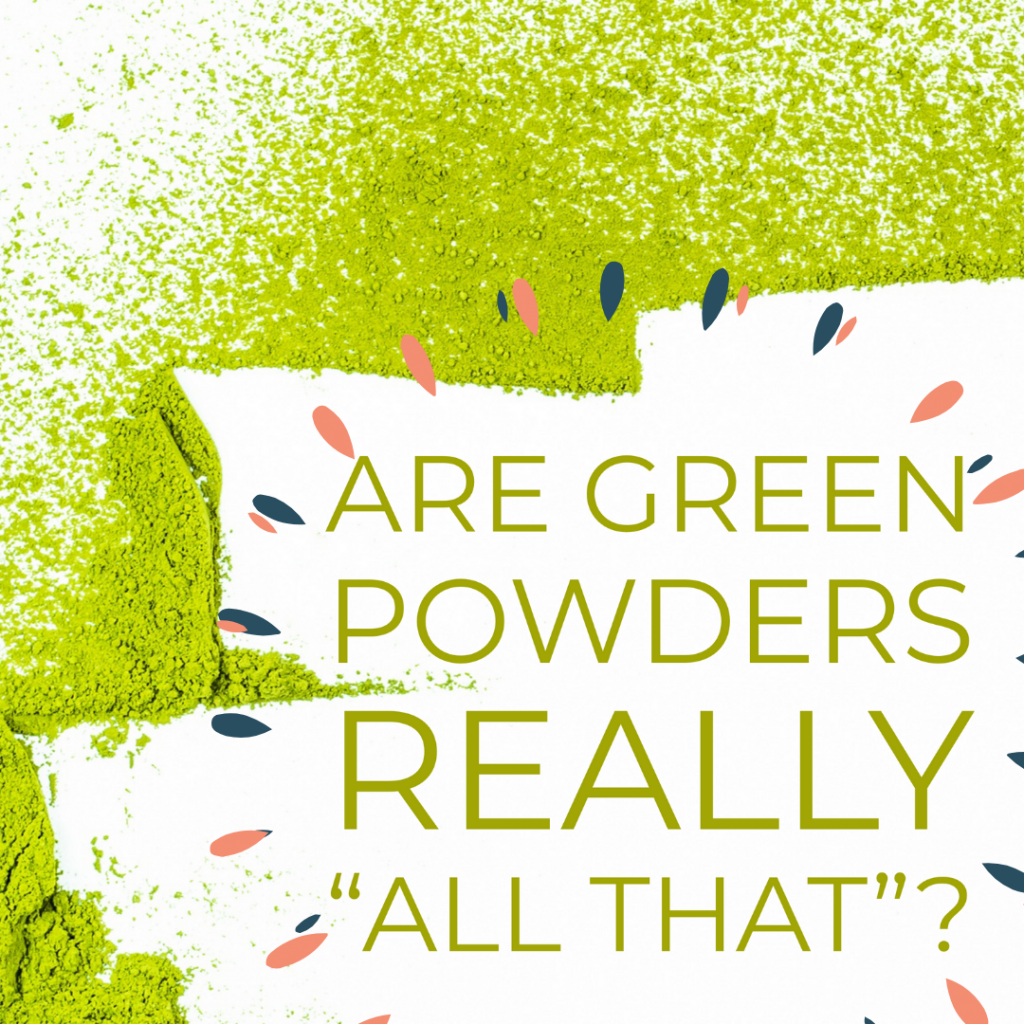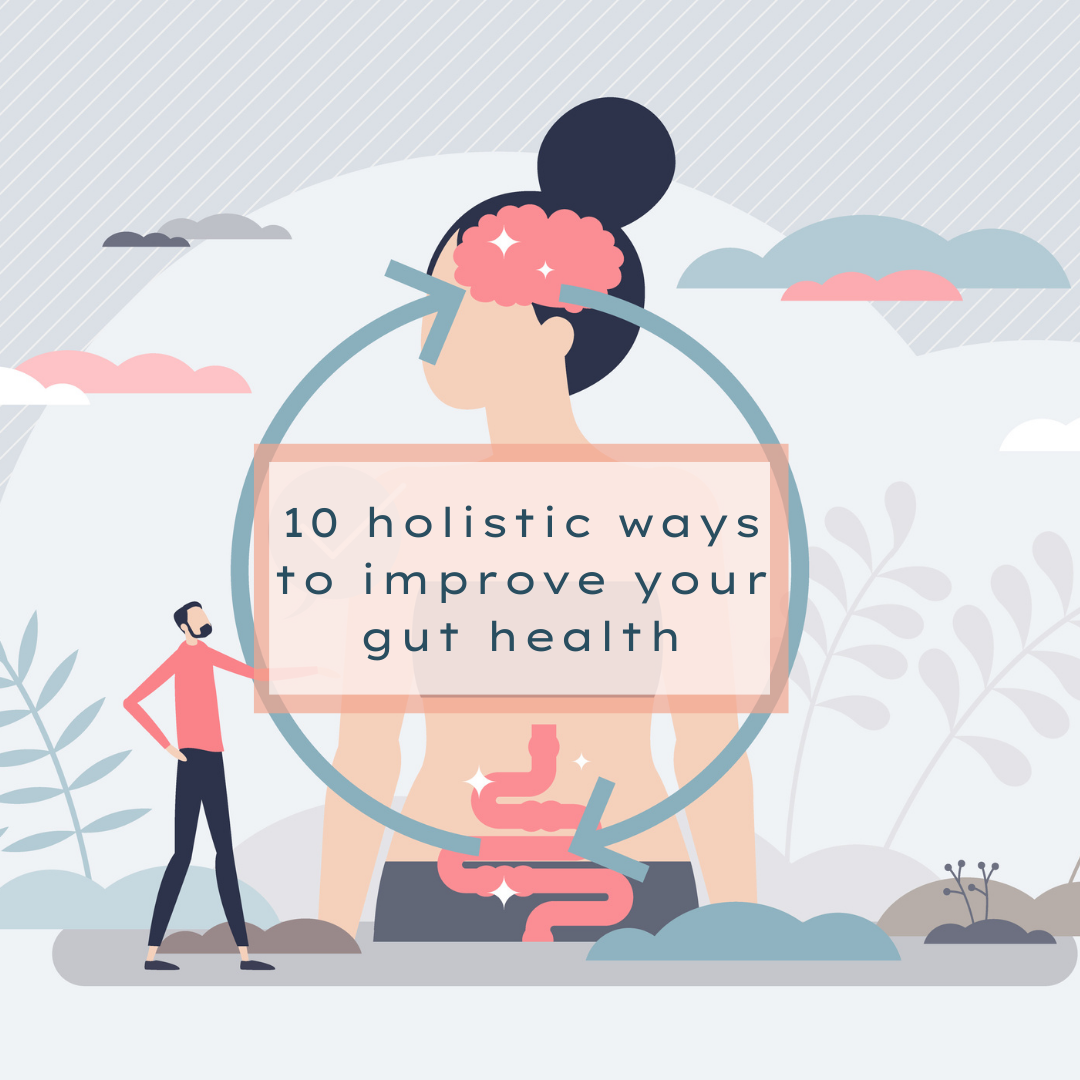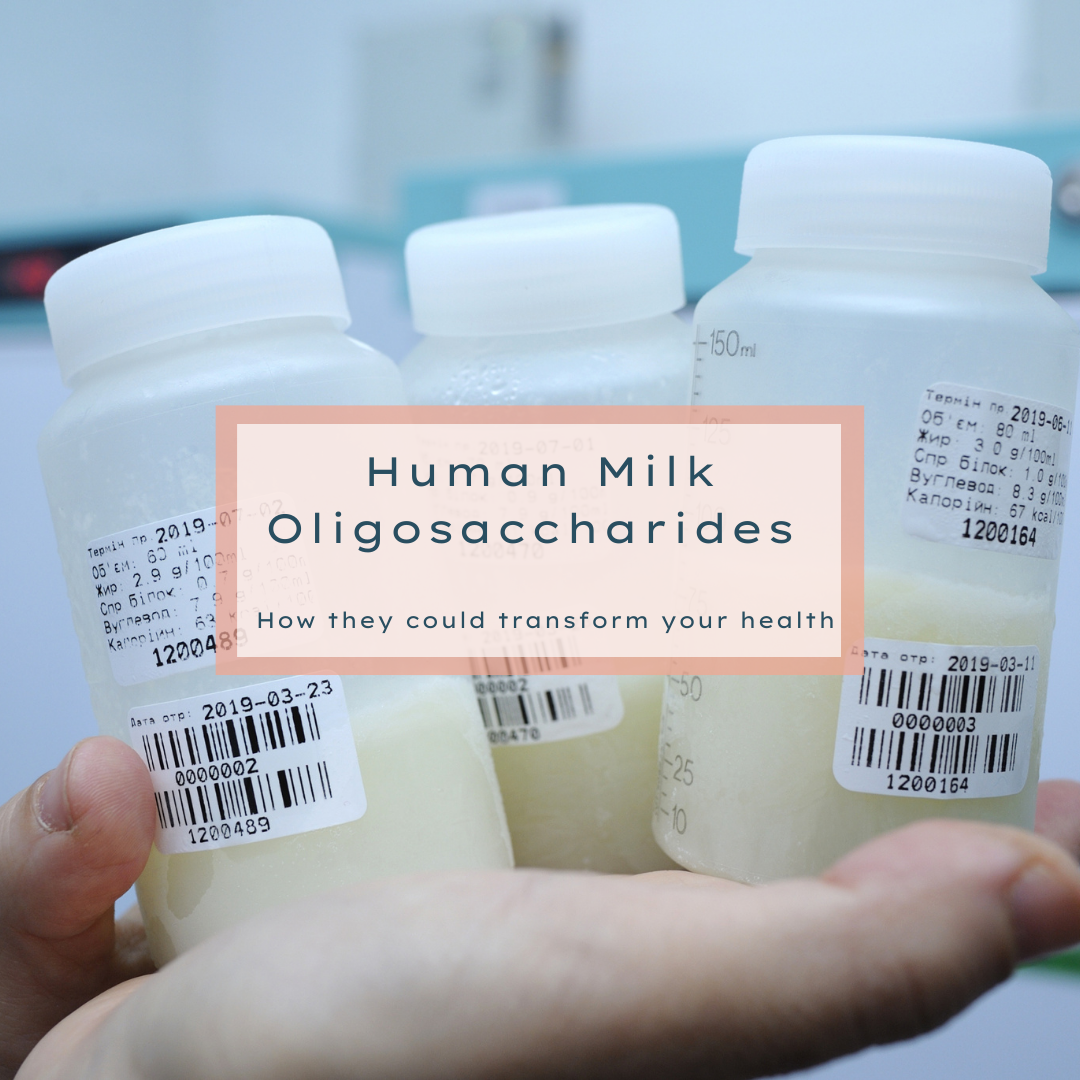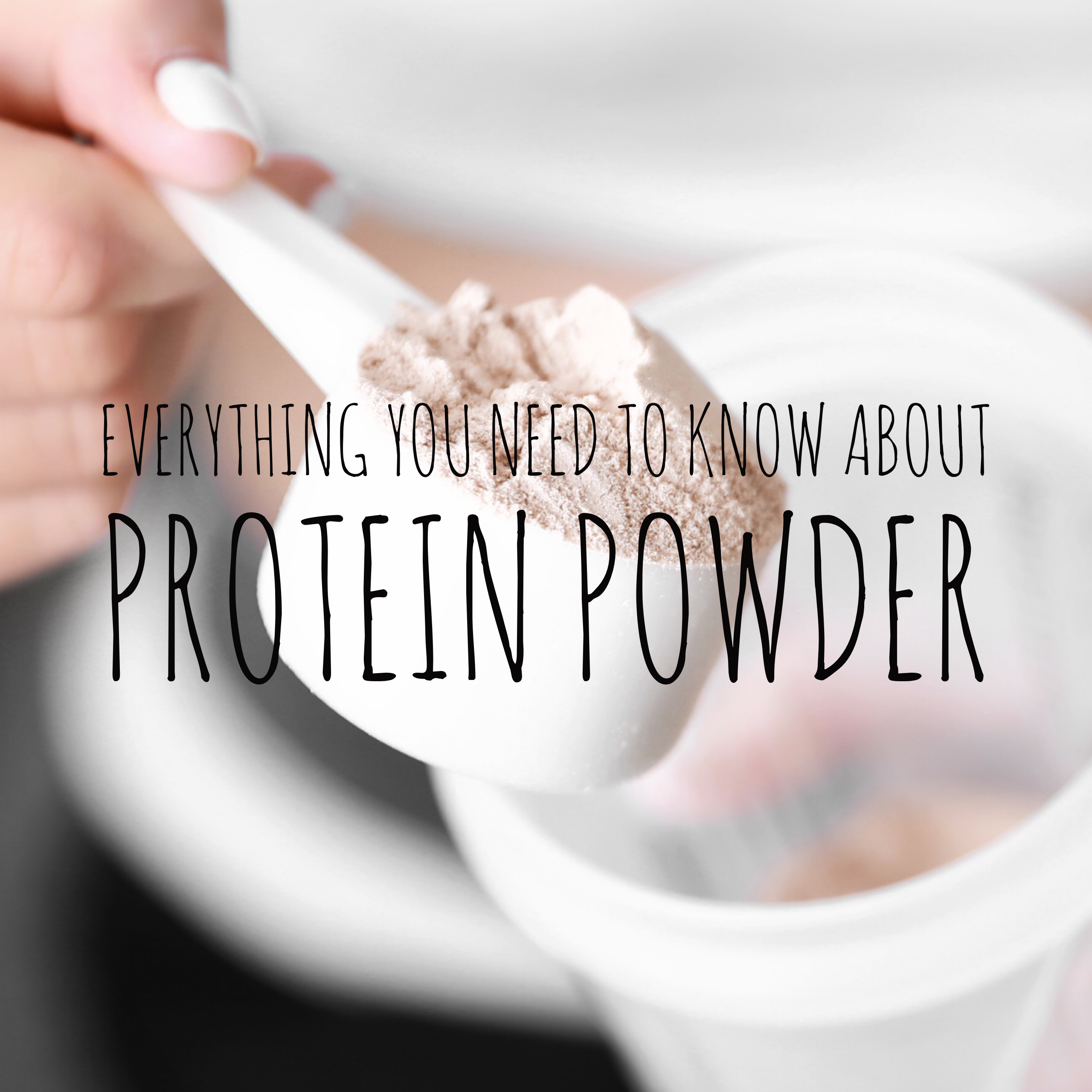It’s always amazing to me what fads become popular and which ones fade away. The greens powder fad seems to be one that started out kind of slow and is now more popular than ever. Usually when a fad is this popular it’s because many are making claims about it in the media. Now that it’s 2021 you can also guarantee that a nutrition or diet fad became popular because it was being pushed by someone famous or you know, a bunch of Instagram & TikTok influencers with no nutrition expertise. It’s not to say that they shouldn’t be sharing what they love but MOST are getting paid to promote it and many will probably not be doing that said fad years from now (I have no research on this, just a hunch). So now that we are here, let’s discuss greens powders and if you should be taking them.
What are Greens Powders?
Great question. Greens powders are quite literally what they sound like, a powder that is green. I will give them that; they are very transparent in the marketing of what the product actually looks like. These greens powders have a variety of ingredients depending on which brand you are purchasing. Some of the ingredients include:
- Powdered green vegetables, some examples:
- broccoli flower powder
- beet root powder
- carrot root powder
- Powdered fruits, some examples
- papaya fruit powder
- apple powder
- acerola fruit juice powder
- Digestive Enzymes
- Powdered herbs
- Powdered mushrooms
- Prebiotics
- Probiotics
- Green tea powder (aka Matcha)
- …and more
As I mentioned, every brand is different, but here are a few brands that I have heard about over and over again that you can check out for yourself (I am by no means promoting them, just sharing the ones I see often):
- 1st Phorm ($59.99/ 30 servings)
- Amazing Grass ($29.99/30 servings)
- Athletic Greens ($97/ 30 servings or $77 if you get a monthly subscription)
- Vital Proteins Collagen Beauty Greens ($49/14 servings)
- …not to mention MLM brands like Arbonne ($54/30 servings), Beachbody ($34.95/20 servings) & Monat ($59/30 servings)
Note: I included the price for reference in case you were wondering how much it costs to get powdered down veggies, greens, fruits, etc.
What are the claims?
The crazy thing about supplements is that they are not highly regulated. What does that mean? That means that many companies can get away with skirting around the whole truth when it comes to their products. While, yes there are certain claims they CANNOT make, they may be able to make some wishy-washy claims that sound great to the consumer but really mean nothing and are backed my little to no research. OR they are grasping at straws. For instance, many of these greens products have “proprietary blends” which means they may be listing the actual components of the blends but never tell you how much of each product or ingredient are in the blend.
This is troublesome because you may be thinking, WOW I’m getting green tea powder (matcha) in this product which does have some solid research behind it (see below) but it’s actually in there in such a tiny amount that it more or less is useless to you the consumer. So you aren’t getting what you pay for which in some of the cases of these products is a shame because you are shelling out a great deal of money for them.
Many people fall victim to the claims made on food products. Why? Because I think we all want to believe that we are truly doing the best for our health. What’s wrong with that? Absolutely nothing. The problem is that companies prey on this because they know what sells. The claims may not be all that solid and so you may end up spending far more money on something with the false pretense that it’s going to give you X outcome when really it may not even come close to that outcome for you.
So here are some of the claims I have seen made on the greens powders:
- Supports Energy
- Supports Brain & Neural Function
- Supports Immune system
- Supports Gut Health & Digestion
- Supports Liver Function
- Supports Hormone Function
- Supports the body’s natural detox process
- Supports Blood Sugar Levels Already within normal range
- Naturally Balances and Increases Alkalinity
And while you are sitting there in awe of the power of greens powders (I am being sarcastic of course) please do not ignore the fine print you will find on the bottom of many of these packages:
**These statements have not been evaluated by the Food and Drug Administration. This product is not intended to diagnose, treat, cure or prevent any disease.
What does the research say?
Okay so you see the claims and know the ingredients of these products, but what does the research say? While I could go through every last ingredient in these products (that would take me WEEKS), it would be pointless because as I mentioned before, most of these products have “proprietary blends”. That means I have no way of knowing how much of each ingredient is truly in there which then kind of defeats the purpose of scouring the research for each ingredient as they may have a large quantity of the ingredient with the least amount of know health benefits.
Any-who, when I started looking through the research it is truly quite vacant in the powdered greens department. There is a good deal of research on powdered green tea (better known as Matcha to most) but not too many research articles on these superfood type products. Not shocking. I’m sure it would be hard to do research on a “greens powders” in general because each product seems to be a completely different mix of ingredients. That being said I was able to find a few studies, which I figured if you’re interested you can nerd out on.
In this 2011 study, you can see that 10 participants (low number in research land) took three to six teaspoons of greens powders per day (that’s 1-2 Tbsp) for a 4-week period. They tracked the blood levels of total antioxidant capacity, polyphenol content, protein, lipid and LDL oxidation, and the level of glutathione peroxidase. The results showed that the powders were well tolerated and that a reduction of oxidative damage in their blood showing that the greens were effective in that small sample size. Also important to note that they used 10 “healthy” individuals who were non-smokers and not on any vitamin supplementation but we don’t know what their diet consisted of so hard to know if this was a big improvement for them or not diet-wise.
Next up,
The only other research article I could find was one done in 2009 and had to do with testing out greens powders on hypertensive (high blood pressure) individuals. The subjects took the supplement for 90 days and they did show a reduction in blood pressure. However, it is unclear what the diets of these individuals looked like prior to the study and if diet and lifestyle changes would have made the same results.
So while it does appear that there may be some positive results from greens powders I just don’t think we have enough information to declare them a superfood or a must add to our regimen quite yet. However, if you are interested in adding greens powders to your daily routine please make sure you do your research on the quality of the product. You ideally want a product that is third party tested and is transparent on their website.
Are greens powders worth it?
In my personal and professional opinion? No. They are overpriced and there truly isn’t enough research out there touting the claims that the companies who sell them are. Does that mean if you like them or you feel better using them you shouldn’t use them? Of course not. As with anything in this world, you get to make that final decision for yourself.
I personally think time and money would be better spent doing the following:
- Drinking ½ your body weight in ounces in water daily
- Getting 7-9 hours of sleep per night
- Aiming for 3-5 servings of vegetables per day
- Grabbing for 1-2 servings of fruit per day
- Moving your body (But not overdoing it) daily
- Managing stress as you are able
Yes, none of that is as sexy as taking the coolest new greens powder your fave celeb is taking BUT I promise you that they probably wouldn’t be taking those powders either if they didn’t receive them for free and/or were not getting paid to promote them.
If you’d like to listen in to this episode, tune into the Bites Radio podcast above. If you’d like to keep up to date on all the latest, comment or join the conversation, be sure to head over to the bites radio Facebook page, or follow me on Instagram! And lastly, if you liked todays blog post or previous posts, be sure to subscribe to the Bites Radio podcast for weekly bites of nutrition knowledge!






Very good post. I absolutely appreciate this website. Stick with it!
Your article helped me a lot, is there any more related content? Thanks!
Thanks for sharing. I read many of your blog posts, cool, your blog is very good.
Your article helped me a lot, is there any more related content? Thanks!
Your point of view caught my eye and was very interesting. Thanks. I have a question for you.
Your point of view caught my eye and was very interesting. Thanks. I have a question for you.
Your point of view caught my eye and was very interesting. Thanks. I have a question for you.
Your point of view caught my eye and was very interesting. Thanks. I have a question for you.
I was suggested this web site by my cousin. I’m not sure whether this post is written by him as no one else know such detailed about my trouble. You are incredible! Thanks!
Thanks for sharing. I read many of your blog posts, cool, your blog is very good.
Your article helped me a lot, is there any more related content? Thanks!
Your point of view caught my eye and was very interesting. Thanks. I have a question for you.
Thanks for sharing. I read many of your blog posts, cool, your blog is very good.
Thank you for your sharing. I am worried that I lack creative ideas. It is your article that makes me full of hope. Thank you. But, I have a question, can you help me?
Some really superb info , Gladiola I found this. “Genuine goodness is threatening to those at the opposite end of the moral spectrum.” by Charles Spencer.
Your point of view caught my eye and was very interesting. Thanks. I have a question for you.
Thanks for sharing. I read many of your blog posts, cool, your blog is very good.
Your point of view caught my eye and was very interesting. Thanks. I have a question for you.
Thanks for sharing. I read many of your blog posts, cool, your blog is very good.
Thanks for sharing. I read many of your blog posts, cool, your blog is very good.
Thank you for your sharing. I am worried that I lack creative ideas. It is your article that makes me full of hope. Thank you. But, I have a question, can you help me?
Thank you for your sharing. I am worried that I lack creative ideas. It is your article that makes me full of hope. Thank you. But, I have a question, can you help me?
Your point of view caught my eye and was very interesting. Thanks. I have a question for you.
Your point of view caught my eye and was very interesting. Thanks. I have a question for you.
Thank you for your sharing. I am worried that I lack creative ideas. It is your article that makes me full of hope. Thank you. But, I have a question, can you help me?
Your point of view caught my eye and was very interesting. Thanks. I have a question for you.
Thank you for your sharing. I am worried that I lack creative ideas. It is your article that makes me full of hope. Thank you. But, I have a question, can you help me?
Thank you for your sharing. I am worried that I lack creative ideas. It is your article that makes me full of hope. Thank you. But, I have a question, can you help me?
Thanks for sharing. I read many of your blog posts, cool, your blog is very good.
Thank you for your sharing. I am worried that I lack creative ideas. It is your article that makes me full of hope. Thank you. But, I have a question, can you help me?
Thank you for your sharing. I am worried that I lack creative ideas. It is your article that makes me full of hope. Thank you. But, I have a question, can you help me?
Your point of view caught my eye and was very interesting. Thanks. I have a question for you.
Your article helped me a lot, is there any more related content? Thanks!
Thank you very much for sharing, I learned a lot from your article. Very cool. Thanks.
Thank you for your sharing. I am worried that I lack creative ideas. It is your article that makes me full of hope. Thank you. But, I have a question, can you help me?